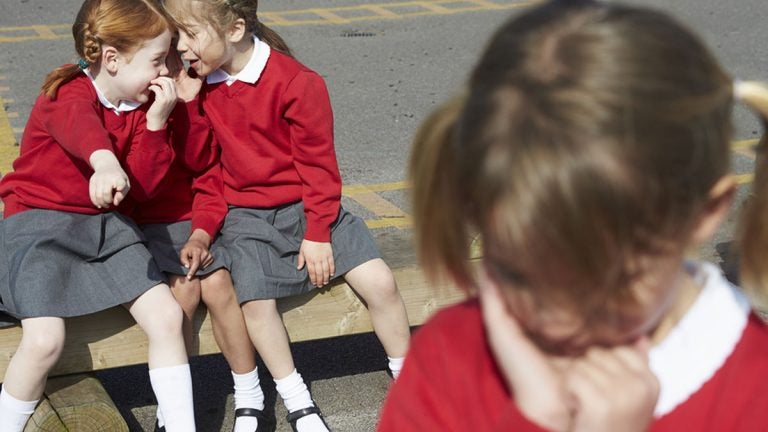5 steps you can teach your kids to be more empathetic

(Big Stock File Photo)
 Every new school year parents scramble (well, at least in our not so organized house we scramble) to find the back to school supply list, gather those pencils and notebooks, and hope that the backpack can make it through another season. If we want our kids to succeed in school this year (and in life in general) and of course we do, there’s one more supply that needs to be restocked—empathy.
Every new school year parents scramble (well, at least in our not so organized house we scramble) to find the back to school supply list, gather those pencils and notebooks, and hope that the backpack can make it through another season. If we want our kids to succeed in school this year (and in life in general) and of course we do, there’s one more supply that needs to be restocked—empathy.
Empathy? Some of you may say—of course, my child has that, others may throw up their hands and surrender that their social media attached kids are a lost cause.
We might wish our kids would be kinder in the local sense: not be mean to their siblings, notice when you are upset and ask why, and globally: have an interest and concern in the suffering and well-being of others they might hear about in the news. But in many ways our kids are living off the grid of other’s experience. There’s just no there, there.
But here’s why they can’t be.
According to psychologist, Michelle Borba, author of the new book: UnSelfie: Why Empathic Kids Succeed in Our All-About-Me World, we are in the midst of an empathy crisis. The crisis is “human-made” and can be flipped. Why is that important? The benefits of being empathic may be obvious and intuitive to the recipients of that empathy, but Dr. Borba explains how the ability to decenter, manage emotions, switch perspectives, broaden perceptions, benefits our children directly. In her words, “the ability to empathize affects our kids’ future health, wealth, authentic happiness, relationship satisfaction, and ability to bounce back from adversity. It promotes kindness, prosocial behaviors, and moral courage, and it is an effective antidote to bullying, aggression, prejudice, and racism. Empathy also prepares kids for the global world, and gives them a job market boost. In today’s world, empathy equals success, and it’s what I call the Empathy Advantage that will give our children the edge they need to live meaningful, productive, and happy lives and thrive in a complex new world. “
Sign me up! Sign up my kids! Right?
But how?
There are very easy and powerful ways to weave awareness of others into your child’s day to day life, but first a caveat, sink hole, or moment of weakness error that you don’t want to make (though we all have).
When our kids are being pretty “selfie” or in regular speak: selfish, raise your hand if your blood pressure shoots up and steam rises in your head and there is a great temptation while wanting to make your child more thoughtful and considerate that you might want with every fiber of your double-standard (in that moment) being to make them feel bad and guilty for their inability to think of someone else.
Oops.
So we don’t want to teach with guilt, but how do we get our kids attention?
For many of us, our parent’s ideas of kindness, compassion, empathy were delivered to us with a not so hidden message: we were selfish, mean, thoughtless for not seeing it in the first place. This is not your father’s Oldsmobile. We don’t have to parent this way. Just like we are all wired with the potential to learn math, we have to actually be taught it to master it, we need to teach our kids ways of being empathic and the best way is to practice what we are trying to preach and do it judgment free. Because that is really the purpose of empathy: it’s not to agree with the way that someone acts or thinks that is different from us. It’s to agree that the way that a person acts or thinks that is different from us makes sense to them and is their right, just as it is ours. It’s about getting our judgment out of the way.
Here are five ways to exercise your child’s empathy muscle this school year and beyond:
1 -Use your curiosity about your child’s point of view to encourage your child’s curiosity about others
When your child is upset at something a teacher or a student did if you want to cultivate empathy—start with it yourself. Go in with compassion first, rather than a lecture—I can see that this really is frustrating and upsetting for you. I want to understand what happened. What part is most upsetting to you? Once your child understands that you are “with them”, explore further.
2 – Use zoom in, zoom out language
When your child is focused on the behavior that he is upset about at school: Jesse was so mean today—he took my pencils; Kelsey is so gross she was chewing with her mouth open! I hate the way Marcus is so bossy and just takes over our group project! Ask them to do a zoom in/zoom out. First, zoom in—ask your child what upsets them about those moments, then zoom out and ask them . I would feel upset too if someone tried to embarrass me, so I understand that. I wonder why someone would do that? I wonder what might be going on for them that this happened? In this way you are cultivating curiosity rather than judgment. If a teacher yells at your child, this is still not OK, but understanding that their child is in the hospital, or the class has been acting up all day, puts that action into a broader context of understanding.
3 – When the empathy cupboard is bare, consult a role model
There are times when our children either to defend their position that they aren’t in the wrong, or truly because they don’t know, will insist that they can’t think of why someone would have acted the way they did, or what ways they could respond with empathy. That’s fine. If they can’t put themselves in someone else’s shoes, borrow the shoes from someone else. Ask your child who they want to consult as a role model to give advice about how to make the situation, whatever it may be, turn out better. Athletes, teachers, celebrities, even fictional characters from their favorite books can be called on for their counsel.
4 – Share your empathy struggles, show the seams
What gets kids interest and takes them by surprise is not that their parents are kind to others, it’s when parents reveal a bit more—the fact that ending up with empathy was maybe not where they started. This is what I call showing the seams. Not just the nice finished edge to a story, but the sometimes messy flipside. So, in appropriate doses, share your misunderstanding, or your frustration at how the car rental dealer was being so rigid, or frustrating, and then how you realized that they were short-staffed, or that maybe you imagined that their kids were home sick, and just realized that getting short back wasn’t going to work. And when you said—“long day, isn’t it?” that they softened and were helpful after that.
5 – Link your child’s empathic behavior to their character not just their actions
Research has shown that parent’s (and teacher’s and coaches etc) feedback is much more effective, i.e., leads to more generous behavior going forward when it’s phrased in terms of lasting attributes of the child: You are really the kind of person who likes to help out, or, You are the kind of person who reaches out and is caring whenever you can versus feedback which is about fleeting action: That was nice! That was so kind! with no mention of the child. Similarly, saying—Thanks for being a caring person! Is more effective than saying Thanks for caring.
When you send your child to school this fall, notice when your kids are being that kind person and acknowledge them! Listen too for opportunities to weave the threads of empathy into your conversations when your child hasn’t gotten there first: on the ride to school in the morning, your dinner table talks, at your nighttime tuck in. Keeping kindness and empathy on the radar will help shape a mindset that will show your children that they, by virtue of their actions can make the world a better place. Imagine what can happen when thousands and thousands and millions and millions of parents are doing the same. It gives me chills even in this heat wave! For more ideas check out Dr. Borba’s book — I’ve found it makes for great dinnertime discussions with my family.
Wishing everyone a great school year!
WHYY is your source for fact-based, in-depth journalism and information. As a nonprofit organization, we rely on financial support from readers like you. Please give today.

